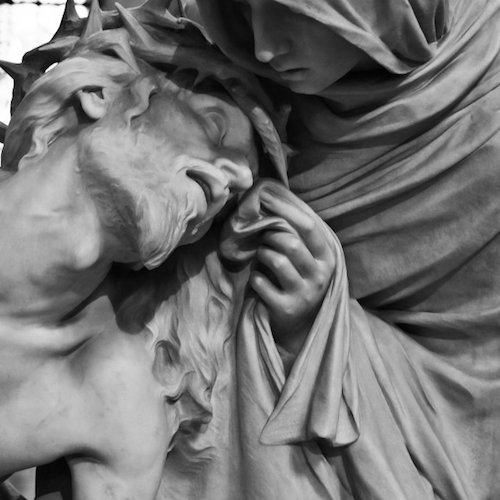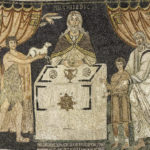We run our website the way we wished the whole internet worked: we provide high quality original content with no ads. We are funded solely by your direct support. Please consider supporting this project.

A Foolish and Weak-Looking God
The New Testament assumes that the God of Israel and the God revealed in Jesus Christ are one and the same God. But there also can be no question that the portrait of God that was unveiled when the Messiah arrived on the scene was in some respects quite different from what the OT had prepared most Jews to expect. N.T. Wright captures the unprecedented impact Jesus made when he notes that, since his coming, the very meaning of the word “God” has to be “again and again rethought around the actual history of Jesus himself” (Jesus and the Victory of God, 661). The new insights that Jesus reveals about the character of the God of Israel is nothing short of shocking.
Undoubtedly the most astounding new dimension of the God of Israel that Jesus unveils concerns the “foolishness” and “weakness” of his voluntary death on the cross on behalf of his enemies (1 Cor. 1:23). Paul’s attribution of “folly” and “weakness” to God constituted a new language of God. Even more it is a new understanding of who God is. The way in which Paul and his communities placed the cross at the center of their understanding of what Jesus revealed about God constituted a transformation in their conception of God. One theologian argues that the revelation of God in the crucified Christ “stands God on the head” (D. Georgi, Theocracy in Paul’s Praxis and Theology, 54). And it is for this reason that we must rethink the very meaning of the word “God” in light of Jesus.
The writer of Hebrews put it this way, “In the past God spoke to our ancestors through the prophets at many times and in various ways, but in these last days he has spoken to us by his Son, whom he appointed heir of all things, and through whom also he made the universe. The Son is the radiance of God’s glory and the exact representation of his being, sustaining all things by his powerful word” (Heb 1:1-3).
In contrast to all previous spoken and written revelations, Jesus is God’s own Son. As is the case throughout the NT, the import of referring to the “Son of God” is not to suggest that Jesus is only a Son and not God himself, but to suggest that he is the very embodiment of God. While God revealed himself in a diversity of ways in the past, only in Christ has God come in person. Torrance wonderfully captures the radically new thing that took place in Christ when he says,
In Christ, what God communicates to man is not something, but his very self. This is distinct from all other acts of God. This is God’s unique act, his reality-in-the-act, and apart from this act there is no God at all….in Jesus Christ God acts in such a way that he is himself in his act, and what he acts he is, and what he is he acts….Jesus Christ as act of God in humanity is identical with God’s own person (T.F. Torrance, Incarnation, 107-8).
Because the weak-looking Jesus who was crucified is identical with God’s own purpose, he is the one who alone is the radiance (apaugasma) of God’s glory (doxa) as well as the one and only exact representation (charactēr) of God’s very essence (hypostasis). Whatever value previous revelations have, they fall short of this. They may to some degree reflect God’s glory, but the crucified Son alone reflects the full brilliance of his glory. They may to some extent represent God, but the Son alone is the exact reflection of God’s character. And they may reflect aspects of God’s being, but the Son alone reveals God’s very essence.
What is more, the crucified Jesus is the one through whom all things came into being and the one for whom everything exists, a view expressed elsewhere in the NT (Jn 1:2; Col. 1:15-17). This means that Jesus is not only the one perfect expression of God’s essence; he’s also the perfect expression of God’s purpose for creation. God is working in and through everything that exists and every event of history to eventually bring every aspect of creation into a harmonious whole under Christ (Eph. 1:9-11). If we take this revelation seriously, it means that everything God is and everything God is about is found in this foolish and weak-looking God, and in him alone.
Photo via Visual Hunt
Category: General
Tags: Cruciform Theology, God, Jesus
Related Reading

Forgiving the Unforgivable
Osheta Moore wrote a courageous and challenging post last week entitled Washing the Feet of the Steubenville Rapists. It’s not an easy read, and if you’re vulnerable to triggers in this area, you might want to exercise caution. But Osheta offers a glimpse of redemption in the darkest of places. Can we move towards forgiveness…

The Cruciform Center Part 1: How Matthew, Mark and Luke Reveal a Cruciform God
In the previous series of posts I’ve argued that a merely “Christocentric” approach to God is too general, as can be shown by the widely different conceptions of God people arrive at, despite their claim to be “Christocentric.” The confession that Jesus reveals what God is like is simply too abstract, for it leaves too…

Isn’t it contradictory to say Jesus is “fully God” and “fully human”?
READER: God is, by definition, eternal, having neither beginning nor end. Human beings are, by definition, finite, beginning at a certain point in time. How, then, can Jesus be both God (eternal) and human (finite)? Isn’t that a contradiction? Similarly, while God is omniscient, humans aren’t. How could Jesus be both omniscient God and non-omniscient…

Why Are Jesus’s Parables So Violent? (podcast)
Greg pops the hood to offer a helpful tutorial on how parables operate. Episode 609 http://traffic.libsyn.com/askgregboyd/Episode_0609.mp3

The Centrality of Christ in Hebrews, Part 2
The intensely Christocentric reading of the Old Testament that I introduced in the previous post is reflected throughout the book of Hebrews. Here I want to cite two more examples of how this writer saw Christ at the center of the OT. Hebrews 7 Here the author argues for the superiority of Christ’s priesthood over…

What Are the “Keys to the Kingdom”?
And I tell you that you are Peter [petros = rock], and on this rock I will build my church, and the gates of Hades will not overcome it. I will give you the keys of the kingdom of heaven; whatever you bind on earth will be bound in heaven, and whatever you loose on…
